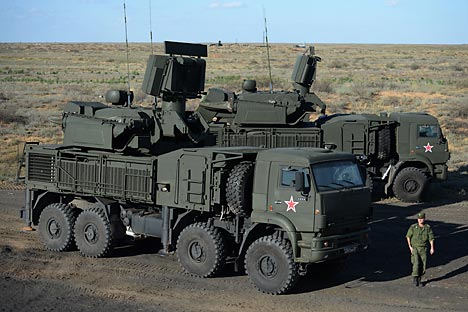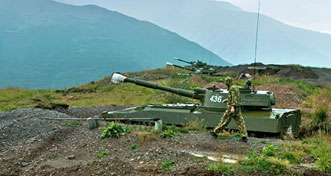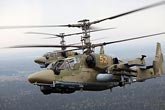Russia begins supplying arms to Iraq

Russia will supply 48 Pantsir-S1 anti-aircraft missile gun systems to Iraq. Source: RIA Novosti
Russia has begun supplying arms to Iraq, the counselor of the prime minister of Iraq, Ali al-Musawi, announced to Russia TV Channel on Oct. 21. These deliveries are part of the contract that was signed back in 2012.
The counselor stated that the contract provides mainly for the supply of weapons to fight against terrorists. “Therefore, helicopters that have worked well in counter-terrorism operations will be delivered. In addition, special anti-terrorist equipment will be supplied,” said Musawi.
Ali al-Musawi also explained that the Iraqi defense system, created with the assistance of the U.S. and the West, has as its main objectives the protection of the country's sovereignty and the fight against terrorism.
“Iraq does not have offensive weapons, as it has no expansionist plans. Iraq seeks only to ensure its own sovereignty, to protect its wealth and to fight terrorism,” the counselor said.
This contract, worth more than $4 billion, was signed during a visit by the president of Iraq to Moscow in October 2012. It involves the supply of 48 Pantsir-S1 anti-aircraft missile gun systems, as well as 40 helicopters — Mi-35 and Mi-28NE.
Baghdad originally planned to buy 36 Russian helicopters, but, in April 2013, this number was increased by four. The first group of Iraq experts completed training on the Mi-35 in the Russian Airforce Center in Torzhok.
Russia and Iraq also held talks on the supply of MiG-29M/M2 fighters and armored vehicles, but the details of this meeting have not been released.
Earlier, Russia wrote off Iraq’s debts in exchange for the proposed large-scale purchase of Russian weapons.
In addition, in June of this year, the two countries signed a contract to supply Ka-52 military helicopters to Iraq. The preliminary agreement for the supply of these aircraft was signed in October 2012.
In early 2013, there were reports that the contract for the supply of helicopters and ZRPKs (anti-aircraft missile and gun systems) was canceled. However, in February, at a press conference at Russia’s Ministry of Foreign Affairs, Anatoly Isaykin, general director of Rosoboronexport, said that the contract was never canceled, but had not yet entered into force.
Speaking about the circumstances of the transaction, Ali al-Musawi noted that the Iraqi side “was suspicious of this contract,” on account of possible corruption. “However, before its implementation, agreements were reached between President Vladimir Putin and the prime minister of Iraq on revisions to the contract, in order to prevent any violations,” said Musawi. “So, in the end, the deal was signed. Now the first stage of the contract is being fulfilled.”
Iraq acquired most of its military equipment from the Soviet Union and Russia. In particular, during the Soviet era, $30.5 billion was spent over 30 years on military equipment. Previous transactions included about 1,000 aircraft and 350 helicopters and air defense systems, as well as ground vehicles and ships.
According to experts, Baghdad’s resumption of military equipment imports from Russia is due to the fact that Iraq’s military forces are familiar with Russian weapons. However, there is a desire to diversify suppliers: Most combat aircraft after the overthrow of Saddam Hussein was bought from the United States. At the moment, the amount of transactions concluded between Baghdad and Washington in the military sphere surpasses $12 billion. Thus, at present, Russia is the second largest supplier of defense products to Iraq.
All rights reserved by Rossiyskaya Gazeta.
Subscribe
to our newsletter!
Get the week's best stories straight to your inbox

